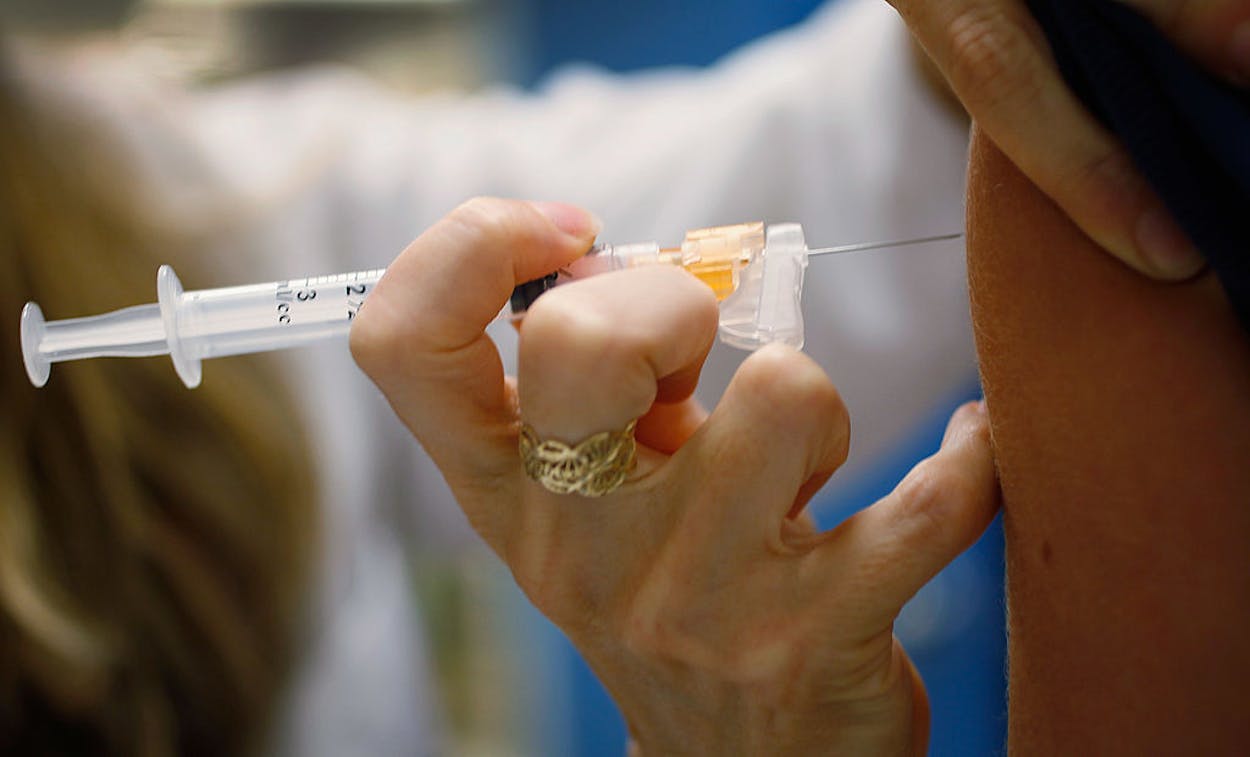In a videotaped statement released late last week, Bexar County District Attorney Nico LaHood sat with his hands clasped on his desk in what appears to be his government office, stared into the camera, and introduced himself: “I’m Nico LaHood,” he said to the camera. “I’m the criminal district attorney in San Antonio, Texas. I’m here to tell you that vaccines can and do cause autism.”
The video was posted on Facebook as a trailer for Vaxxed, a documentary film directed by disgraced former doctor Andrew Wakefield, the author of a since-retracted study that linked vaccines with autism. The film, which doubled down on his research, drew so much criticism from actual doctors that it was pulled from the Tribeca Film Festival this spring. The trailer preceded a longer eleven-minute promotional video released on Tuesday featuring LaHood and his wife, who claim vaccinations are responsible for health problems that their two children have developed.
On Wednesday, LaHood continued his anti-vaccination campaign, posting a long rant on Facebook encouraging parents to “educate yourselves for the sake of your precious children,” and to “stay away from rhetoric and look at hard facts.” As of Thursday morning, the post had garnered nearly 1,500 comments. LaHood’s responses to some of the more critical commenters are politely defensive, though he does call one commenter a “fool with your head in the sand” and “the typical zealot without an open mind.”
Medical experts quickly condemned LaHood’s claims. In a statement released after the video gained traction, the San Antonio Public Health District countered LaHood’s comments. “Vaccinations are not just for protecting ourselves—they also protect the people around us,” the agency said, according to the San Antonio Express-News. “Children cannot make the decision on getting vaccinated but informed parents can.”
Despite repeated assurances from credible health experts such as the Centers for Disease Control that there is no link between vaccinations and autism, more and more parents in Texas are opting out of getting their children vaccinated. Recently released state data shows that 45,000 non-medical exemptions were made last school year, an uptick from about 38,000 the year before, and up from just 3,000 in 2003, the first year a state law went into effect allowing parents to opt out of immunizations, according to the Houston Chronicle.
It’s unclear exactly what effect the vaccine exemptions have had, but since around the time the opt-out law was passed, Texas has experienced an uptick of contagious diseases typically targeted by vaccines. In 2001, Texas had 615 confirmed cases of whooping cough. From 2005 to 2015, Texas averaged nearly 2,400 cases per year (since peaking at 3,985 whooping cough cases in 2013, that figure decreased each of the past two years; 2015 had 1,504 cases). And 38 total cases of measles were reported between 2013 and 2015 in Texas, including a 2013 outbreak infecting 21 people who attended a vaccine-skeptical megachurch outside of Dallas. Texas had already recorded its first measles case of the year just a few weeks into 2016 when a Plano ISD student was infected with the virus in January, according to the Dallas Morning News.
Although the overall percentage of Texas children who are unvaccinated is still very small, the crowd of parents who choose to opt out has powerful political clout—mostly because they’re incredibly passionate about their fears that vaccines will do their kids more harm than good. When state Representative Jason Villalba of Dallas tried to pass a law last year that would remove the exemption protection for parents who have a “conscientious objection” to vaccinations, he was ripped apart by the very vocal crowd of “anti-vaxxers,” as they’ve come to be known. According to the Texas Tribune, Villalba’s proposed bill enraged a few thousand members of a Facebook group for Texas anti-vaxxers. That group quickly formed a PAC, Texans for Vaccine Choice, which ultimately helped kill Villalba’s bill. “These people, they literally said it to my face—they hate me,” Villalba told the Tribune in April, long after his bill flopped. “This is a group that is very dedicated, very organized; this issue is very important to them.”
According to the Tribune, the anti-vax PAC kept going after Villalba even after the bill failed in an attempt to see him defeated in this year’s primary elections. Villalba still won with 55 percent of the vote, but he admitted that the PAC likely made the election closer than he would have liked. He doesn’t seem willing to test them again. “I’m not interested in a suicide mission on this issue,” Villalba told the Tribune, saying he didn’t plan on reintroducing similar legislation targeting vaccine exemptions anytime in the near future.
If any politician does decide to take on the anti-vaxxers, he or she probably wouldn’t have much support from Texas’s top political leaders: both Governor Greg Abbott and Senator Ted Cruz have said that they support giving parents the ability to opt out, though they both also stressed the importance of kids getting their vaccines. “Most states include an exception clause for good faith religious convictions, and that’s an appropriate judgment for the states to make,” Cruz told USA Today last year. “But on the question of whether kids should be vaccinated, the answer is obvious and there’s widespread agreement: Of course they should.” Meanwhile, a spokesperson for Abbott said last year that the governor believes the state’s exemption law “strikes the right balance of requiring vaccinations while still allowing parents to opt out under certain circumstances,” according to the Chronicle.
With officials like LaHood lending credibility to the anti-vaccination movement and the reluctance among Texas politicians to face this small but vocal group of anti-vaxxers, it doesn’t appear as though Texas’s vaccine exemption trend is going to slow down anytime soon.






